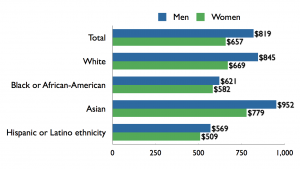Equal Pay in the U.S.
Shannon Mullery
Why should it be that this modern American society can pride itself on being a “melting pot” (of various cultures, ethnicities, religions, sexualities, and other various identities) while simultaneously refusing to treat various Peoples equally? Clearly, this has become an understood issue of gender across the board (77-79 cents to every man’s dollar, depending on who you ask), but we’re not just talking about gender today – statistics show that the wage gap seriously affects Black and Latino Peoples. This graph below estimates the average weekly wages of most adults working full time/earning salaries in the U.S.
It is my firm belief that failing to pay women in the United States of America the same wages as working class man undermines us all of equal rights by also failing to set a precedent of equal treatment of all Peoples within our country. I have argued before that men and women are equal, and men enjoy freedom, so women should enjoy the same freedoms. However, this same argument needs to extend to the wage gap as it oppresses people of color – much further beyond the brief, typical mention in a women’s rights piece on the issue, disclaiming that the problem for women is even worse if they are women of color. Clearly, this issue is as much about race as it is about gender. Intersectionality should be taken into account, but not be seen as the furthest extent of this problem. Republican political candidate, Donald Trump, has weighed in on this topic saying that women would make the same wages if they worked as hard as men. However, Donald Trump is a stupid sophist, and nobody cares very much about what he thinks.
Moving on, I found this article on racial disparities and the tolls the wage gap takes on different ethnic groups to be very useful in understanding this complex issue:
http://www.nbcnews.com/news/asian-america/racial-gender-wage-gap-persists-asian-american-men-top-average-n602076
Denying equal pay denies the necessary incentive for working class individuals to achieve their maximum potential and utilize their skill sets to their fullest extents. People who are oppressed are not able to reach their maximum levels of happiness and utility; people who are oppressed are not granted the same emotional well-being as the non-oppressed. It also arguable that financial income is a vital component of a person or family’s happiness. It is unjust that so many people are not granted the freedom to fulfill their greatest happiness, at least as much as select groups have always retain and still do.
And not in the least of my points, financial income is a sort of measurement of success for many people. While there are many different things to take into account when measuring one’s success, in our society financial income is always seen as a telling sign of how hard someone has labored, how many hours they have invested in that labor, and how well they perform at whatever task they have dedicated their time and passions to. However, this measurement is intrinsically flawed if we, as a society, fail to enact policies that require fair, equal rewards for the same jobs and the same achievements in all given careers, for all people. In this society, under a government that fails to account for all of us, motivation is lacking, potential innovation is ultimately lost, and extraordinary individuals slip right through this gap.

